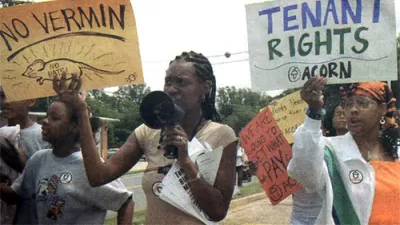A new study from Boston reveals that large landlords, who are less likely to live near their tenants, execute far more eviction filings than smaller property owners.

A new study using data from Boston analyzes how the characteristics of different landlords impact their actions when it comes to evicting tenants. The study focuses on small versus large landlords, defined as those owning 15 or more properties—a demographic that makes up less than 1 percent of property owners but owns over one third of rental units in Boston. Henry Gomory describes the study’s key findings in Housing Matters.
The study reveals that “Large landlords filed evictions 186 percent more often and medium landlords filed 55 percent more often than small landlords.” This is driven by ownership structure, Gomory explains. “Filing rates before a sale were similar across properties, but filing rates for buildings bought by large owners quadrupled in the sale year and then remained higher than before.” The authors attribute this in part to the relationships between landlords and tenants. “Opportunities for informal decisionmaking made it less likely for small landlords to file an eviction; arms-length relationships with tenants and bureaucratic management practices allowed evictions from large landlords to be more instrumental.”
On the flip side, “Filings by large landlords had 68 percent lower odds of ending in execution compared with small-landlord filings.” However, “Even though each filing by a large landlord was less likely to reach execution, large landlords filed so often they still executed at higher rates than small owners.”
The study suggests promoting “policies that incentivize capital investment by local residents and stakeholders, whose social relations in the community may be a more effective strategy for maintaining housing affordability.”
FULL STORY: Do Large Landlords’ Eviction Practices Differ from Small Landlords’?

Alabama: Trump Terminates Settlements for Black Communities Harmed By Raw Sewage
Trump deemed the landmark civil rights agreement “illegal DEI and environmental justice policy.”

Study: Maui’s Plan to Convert Vacation Rentals to Long-Term Housing Could Cause Nearly $1 Billion Economic Loss
The plan would reduce visitor accommodation by 25% resulting in 1,900 jobs lost.

Planetizen Federal Action Tracker
A weekly monitor of how Trump’s orders and actions are impacting planners and planning in America.

Wind Energy on the Rise Despite Federal Policy Reversal
The Trump administration is revoking federal support for renewable energy, but demand for new projects continues unabated.

Passengers Flock to Caltrain After Electrification
The new electric trains are running faster and more reliably, leading to strong ridership growth on the Bay Area rail system.

Texas Churches Rally Behind ‘Yes in God’s Back Yard’ Legislation
Religious leaders want the state to reduce zoning regulations to streamline leasing church-owned land to housing developers.
Urban Design for Planners 1: Software Tools
This six-course series explores essential urban design concepts using open source software and equips planners with the tools they need to participate fully in the urban design process.
Planning for Universal Design
Learn the tools for implementing Universal Design in planning regulations.
Caltrans
Smith Gee Studio
Institute for Housing and Urban Development Studies (IHS)
City of Grandview
Harvard GSD Executive Education
Toledo-Lucas County Plan Commissions
Salt Lake City
NYU Wagner Graduate School of Public Service





























